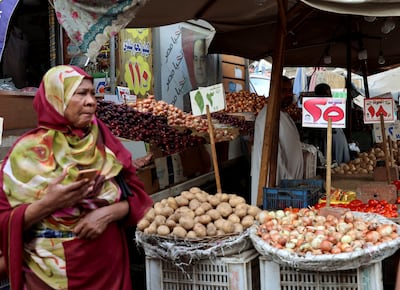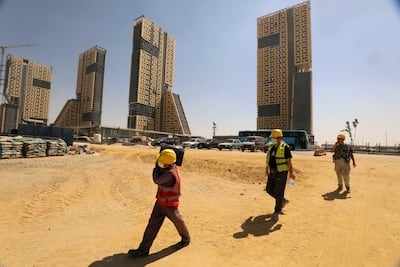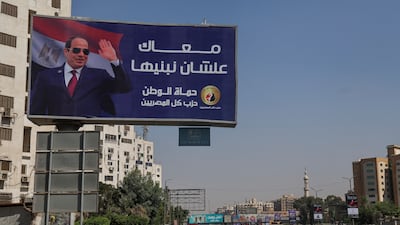President Abdel Fattah El Sisi on Wednesday sought to instil confidence among struggling Egyptians, saying the “end is near” for the nation's economic troubles.
He also defended his handling of the economy, citing fast-paced development projects undertaken since he took office in 2014.
Those initiatives have prevented a complete meltdown of the economy in the aftermath of the coronavirus pandemic and the Russia-Ukraine conflict, he said during a ceremony marking the Prophet Mohammed's birthday.
Mr El Sisi is widely expected to seek re-election in a vote scheduled for December, although he has yet to make an official announcement.
Should he run, his victory would be virtually certain, giving him another six-year term by the end of which he will have served 16 years at the helm of Egypt.
The vote will take place amid the nation's worst economic crisis.
The Egyptian pound has lost half its value since March last year and a foreign-currency crunch has hurt imports and local industries dependent on foreign materials.
Record inflation has pushed millions into poverty.

The combined effect of the pandemic and Ukraine war would have normally led to an economic meltdown in the country, Mr El Sisi said.
That fate had been averted thanks to his economic policies, he said.
“Given their speed, scope and size, the unprecedented development efforts have given the economy significant strength and flexibility, something that leads to the conviction that the current difficulties, by God's will, will soon disappear,” he said.
The President, a former army general, also rebuffed criticism of his government's policies, saying “evil people” should not be allowed to obstruct Egypt's “progress.”
Critics have long lambasted Mr El Sisi's government for excessive borrowing – foreign debt stands at more than $160 billion – to finance mega infrastructure projects they see as unnecessary to build while vital sectors such as health care and education are ailing.

They also complain of a perceived lack of government transparency and the prominent economic role given to the military, which they say robbed the private sector of a level playing field.
Mr El Sisi has repeatedly rejected such claims, saying he approached the military to ensure discipline and timely execution.
He said scores of private sector companies have been given a generous share of construction work being carried out, which includes a new capital in the desert east of Cairo, a resort city on the Mediterranean, thousands of kilometres of new roads and a costly overhaul of the rail network.
He said: “Trust me, the path we chose tries to be straightforward, honest and true to God … nations are built on the foundation of truth, work and honesty … the evil folks will never succeed.”


